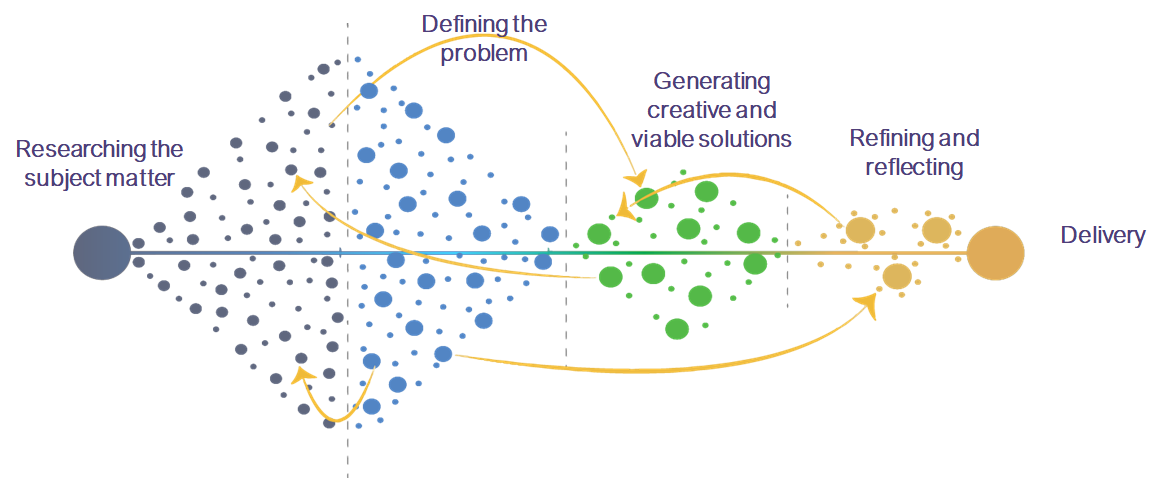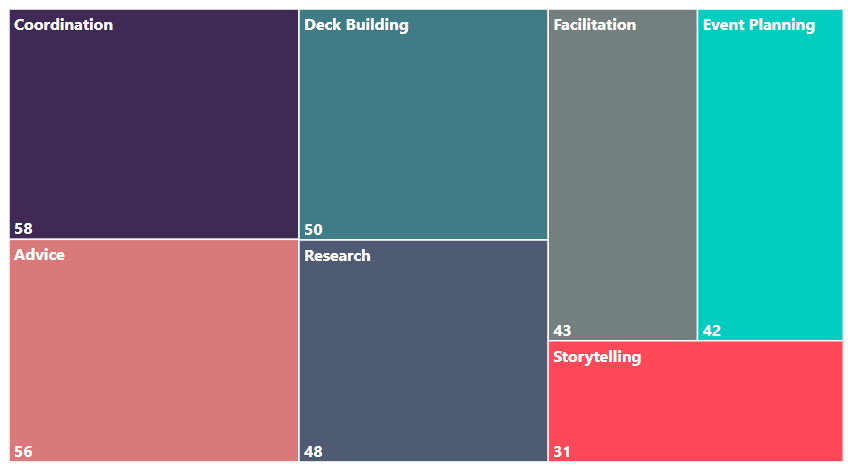Important: The GCConnex decommission will not affect GCCollab or GCWiki. Thank you and happy collaborating!
Ankita2
| How We Can Help | How We Work | Who We've Helped | FAQ | Contact Us |
|---|
|
For best results please view this page on a desktop browser The Surge TeamEstablished at the Canada School of Public Service in late 2018, the Surge Team supports policy projects where quick action or breakthroughs are needed. We do not have ongoing files. Instead, the team collaborates with partners on time-limited projects at the School and across the federal public service.
|
|
|
|
|
How We Work
Our approach is most effective with engaged and collaborative partners: we use regular touchpoints throughout the project to build off your expertise and respond to your needs.
| Discuss | Design a Plan | Develop and Deliver | Conclude |
| - Explain our service model - Learn about your needs - Discuss objectives, scope, and timelines - Develop a proposal |
- Discuss specific deliverables and identify key stakeholders - Determine roles and responsibilities - Agree on timelines - Draft a Memorandum of Understanding |
- Evaluate progress and incorporate feedback into product(s) - Revise deliverables, scope, and timelines as needed to meet objectives |
- Close out deliverables - Discuss project transition period - Share lessons learned to promote continuous learning |
As a team, we work in a series of short sprints and deep dives to improve the quality of products. Our work is iterative and collaborative, learning equally from failures and successes. Consulting with stakeholders is a critical part of how we do our work. Our projects are often non-linear, redefining problem statements and generating more research as we move forward and change course as needed.
Who We've Helped
Since December 2018, we have worked with several organizations to deliver over 50 projects with more than 150 individual deliverables. You can find details on these projects, as well as lessons we've learned from them, on our GCXchange site.
Our projects touch on many policy areas, including public administration and machinery of government, Indigenous relations, national security, social policy, and innovation, among others.
Examples of Projects:
| Online Transition Planner and Checklist: A tool to support Government transition
Partnership with the Privy Council Office Centralized a checklist of tasks to be completed for all incoming and outgoing Ministers, staff, and offices Deployed a Software-as-a-Service (SaaS) tool across the GC Provided an enterprise-wide view of transition activities for the Privy Council Office | |
| Behavioural Insights Blended Services Pilot: Facilitated Workshop Learning
Partnership with the Policy Community Partnerships Office, Privy Council Office, and Behavioural Insights Team Applied a team-based learning-by-doing approach to teach public servants about Behavioral Insights and make concrete progress on real problems Combined expert-led training and one-on-one support to develop BI-based interventions for real world challenges | |
| Reconciliation Primer: Policy Brief and Learning Tool
Partnership with Health Canada Primer for public servants on the need for reconciliation and the role they can play Developed in consultation with Indigenous public servants and policy experts Content contributed to the app Reconciliation: A Starting Point | |
| Modern Public Engagement: Facilitated Discussions and Engagement Framework Development
Partnership with Transport Canada Curation of tools and resources relevant to public engagement that will support TC's Transformation Plan Provides a public engagement framework in prototype format that articulates 5 broad phases of engagement and explores best practices | |
| Memorandum to Cabinet Process
Partnership with Employment and Social Development Canada Research and Analysis to support pre-drafting process (how to tell a good story through an MC) Strategic advice and Surge capacity for coordinating a horizontal MC Curated tools and resources to support drafting process | |
| Renewed Horizontal Performance Measurement Framework
Partnership with Employment and Social Development Canada Engagement of 12 federal organizations to identify practices for more consistent and meaningful performance measurement Stock-take of data and briefing materials to support the adoption of a new logic model Development of practices for viable disaggregated data collection and reporting |
Testimonials:
|
|
|
|
|
|
|
FAQ
How many projects does Surge normally take on?
Typically, 2-4 projects at any given time, with start and end-dates staggered.
What is the average duration of a project? How many analysts work on a project?
Projects usually last from 2 to 8 months. A project team will typically include 3-5 analysts. We do not 'loan out' analysts to departments, unlike the Free Agent Program.
How does the cost sharing approach to projects work?
CSPS and the partner department sign an MOU outlining costs, roles, timelines and deliverables. Costs are based on analysts' hourly wages and any additional O&M costs, if applicable (e.g., costs to hire an external speaker).
All partner projects are cost-shared - CSPS takes on a certain portion of the project costs (based on discussions and agreement with partners). Funds are collected through an Interdepartmental Settlement, typically from partners' O&M budgets.
How long does the MOU take to put in place?
We can normally draft and share an MOU quickly (1-2 weeks), after scope, timelines, and deliverables have been discussed and agreed upon.
Contact Us
If you are interested in working with us or want to learn more about what we do reach out to us at surgesolutionsunit@csps-efpc.gc.ca or visit our GCXchange site.






















